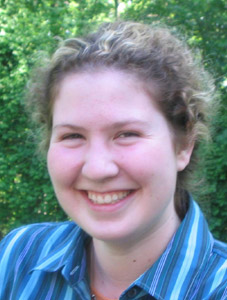SOPHOMORE BIOLOGY MAJOR STRIVING TO COMPREHEND AND CONQUER HEPATITIS C RECEIVES GOLDWATER SCHOLARSHIP

Details
Biology major Rebecca (Becky) Harris ‘08 likes working on problems with“a human urgency,” she says.“It's gratifying to participate, even in a small way, in the collective effort to eliminate a dreadful disease.”
Harris is studying the hepatitis C virus (HCV), and her efforts to better understand and defeat HCV will now receive support from the prestigious Barry M. Goldwater Scholarship, intended for students who plan to pursue careers in science and mathematics. Harris is one of 323 college students from across the country named 2006 Goldwater Scholars.“I am honored to have been selected as one of the recipients of the Goldwater,” she says.“This support will give me the opportunity to continue my research into HCV and the immunology of infectious diseases.”
Harris' interest in immunology was sparked in high school, when she worked in a lab at Philadelphia's Fox Chase Cancer Center studying host-virus interactions. That experience led to her current HCV research in a University of Pennsylvania lab, as well as to Haverford itself.“Haverford is one of the few top liberal arts schools where immunology is a major focus in the biology department,” she says,“and that was one of the reasons I was eager to come here.”
Her research at Penn, overseen by Bryn Mawr alumnus Kyong Mi-Chang, M.D., addresses one of today's most serious public health problems. Right now, approximately 170 million people are infected with HCV worldwide, four million in the United States alone. Most people who are infected with HCV become chronic carriers, says Harris, and the virus can cause cirrhosis, liver failure, and cancer. It causes 10,000-12,000 deaths in the United States each year. At present, there is no preventive vaccine, and antiviral drugs (the standard treatment is interferon with ribavirin) are only moderately effective.
When applying for the Goldwater Scholarship, Harris used her research as the basis for her main essay. She reported data that suggest the immune system's T cell response is often defective in people who fail to clear HCV. The immune system, she explains, has two main branches. The first, the innate immune system, is the body's initial line of defense against outside pathogens. The second branch is called the adaptive or acquired immune system, containing antigen-specific defense mechanisms that take days or weeks to become protective, but will usually provide lifetime immunity against a subsequent infection. The cells of this branch are highly specialized and can give the body specific immunity by producing antibodies and T cells designed to target particular antigens.
“T cells are central players in the HCV drama,” says Harris,“and they come in many varieties.” One type, the helper T cell, secretes cytokines that signal other parts of the immune system, while another kind, called a cytotoxic T cell, kills the cells of the body that host foreign invaders.“In the case of HCV, the virus ‘hijacks' the hepatocytes of the liver and takes over the cell replication machinery in order to generate more virus.”
In the Penn lab, Harris is identifying the genetic determinants of helper T cell proliferative responses to HCV peptides (chunks of the viral antigen that are presented to the T cells by antigen-presenting cells).“When the helper T cells recognize an antigen, they multiply or proliferate in order to up-regulate and maintain effective cytotoxic T cell responses and neutralizing antibodies.” If no proliferation takes place, the response is considered“defective,” she says, raising the question as to why.
“Mapping the genetic basis for helper T cell responses is important for understanding the underlying mechanisms of the disease,” she says,“and could be useful in designing a vaccine that is effective across diverse populations.”
Looking toward the future, Harris is considering a physician-scientist track.“Those programs are very difficult to get into, so my plans may have a collision with reality down the road. But I will give it my best.” Ultimately, she would like to combine research and teaching while also treating patients as an attending physician.“I hope to have a university appointment at some point,” she says,“and work with public health organizations such as the CDC, WHO, and Doctors Without Borders.”
— Brenna McBride



